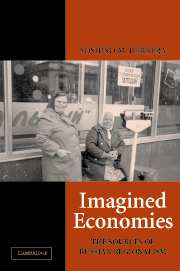Book contents
- Frontmatter
- Contents
- List of Tables
- List of Figures and Maps
- List of Acronyms
- Note on Transliteration
- Acknowledgments
- Imagined Economies
- Introduction
- 1 Regionalism in the Russian Federation: Theories and Evidence
- 2 Imagined Economies: Constructivist Political Economy and Nationalism
- 3 Breaking the Soviet Doxa: Perestroika, Rasstroika, and the Evolution of Regionalism
- 4 To Each His Own: The Development of Heterogeneous Regional Understandings and Interests in Russia
- 5 Imagined Economies in Samara and Sverdlovsk: Differences in Regional Understandings of the Economy
- 6 Regional Understandings of the Economy and Sovereignty: The Economic Basis of the Movement for a Urals Republic
- 7 Regional Understandings, Institutional Context, and the Development of the Movement for a Urals Republic
- Conclusion
- Appendix Tables
- Index
- Cambridge Cultural Social Studies
7 - Regional Understandings, Institutional Context, and the Development of the Movement for a Urals Republic
Published online by Cambridge University Press: 22 September 2009
- Frontmatter
- Contents
- List of Tables
- List of Figures and Maps
- List of Acronyms
- Note on Transliteration
- Acknowledgments
- Imagined Economies
- Introduction
- 1 Regionalism in the Russian Federation: Theories and Evidence
- 2 Imagined Economies: Constructivist Political Economy and Nationalism
- 3 Breaking the Soviet Doxa: Perestroika, Rasstroika, and the Evolution of Regionalism
- 4 To Each His Own: The Development of Heterogeneous Regional Understandings and Interests in Russia
- 5 Imagined Economies in Samara and Sverdlovsk: Differences in Regional Understandings of the Economy
- 6 Regional Understandings of the Economy and Sovereignty: The Economic Basis of the Movement for a Urals Republic
- 7 Regional Understandings, Institutional Context, and the Development of the Movement for a Urals Republic
- Conclusion
- Appendix Tables
- Index
- Cambridge Cultural Social Studies
Summary
Social and institutional contexts affect the development and mediation of local understandings of the economy, as well as the transformation of those understandings into political and economic interests. The perestroika era, and in particular the interplay of orthodox and heterodox attempts at reinterpretation, which eventually destroyed the Soviet doxa, opened the conceptual space for new understandings of the economy and for regional relations in the Federation. That heterogeneous understandings of the economy existed and that they were connected to movements for greater sovereignty has been demonstrated in Chapters 5 and 6. In Sverdlovsk in particular, there was a great deal of negativity in understandings of the economy, and these negative interpretations of economic conditions were linked to the arguments regarding the formation of a Urals Republic. But, in order to complete the story of the formation of economic and political interests and the economic basis of movements for greater sovereignty – that is, to understand the transformation of economic understandings into political interests – we must return to the specific institutional context of the first Russian Republic, 1991–3, outlined in Chapter 4, and consider how the events and institutional configuration of that period affected the construction of political and economic interests in greater sovereignty.
There was no set of fixed economic interests (either corresponding or not corresponding to objective accounts), which, when presented with an institutional opportunity, resulted in the movement for the Urals Republic.
- Type
- Chapter
- Information
- Imagined EconomiesThe Sources of Russian Regionalism, pp. 223 - 244Publisher: Cambridge University PressPrint publication year: 2004



